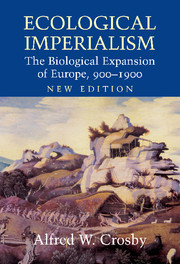Book contents
- Frontmatter
- Dedication
- Introduction
- Contents
- List of illustrations
- Preface to the new edition
- Acknowledgements
- 1 Prologue
- 2 Pangaea revisited, the Neolithic reconsidered
- 3 The Norse and the Crusaders
- 4 The Fortunate Isles
- 5 Winds
- 6 Within reach, beyond grasp
- 7 Weeds
- 8 Animals
- 9 Ills
- 10 New Zealand
- 11 Explanations
- 12 Conclusion
- Appendix: What was the “smallpox” in New South Wales in 1789?
- Notes
- Index
Introduction
Published online by Cambridge University Press: 05 August 2013
- Frontmatter
- Dedication
- Introduction
- Contents
- List of illustrations
- Preface to the new edition
- Acknowledgements
- 1 Prologue
- 2 Pangaea revisited, the Neolithic reconsidered
- 3 The Norse and the Crusaders
- 4 The Fortunate Isles
- 5 Winds
- 6 Within reach, beyond grasp
- 7 Weeds
- 8 Animals
- 9 Ills
- 10 New Zealand
- 11 Explanations
- 12 Conclusion
- Appendix: What was the “smallpox” in New South Wales in 1789?
- Notes
- Index
Summary
The discovery of America, and that of a passage to the East Indies by the Cape of Good Hope, are the two greatest and most important events recorded in the history of mankind.
—Adam Smith, Wealth of Nations (1776)Yet, if we wield the sword of extermination as we advance, we have no reason to repine the havoc committed.
—Charles Lyell, Principles of Geology (1832)Wherever the European had Trod, death seems to pursue the aboriginal. We may look to the wide extent of the Americas, Polynesia, the Cape of Good Hope, and Australia, and we find the same result.
—Charles Darwin, The Voyage of the Beagle (1839)The discovery of America, the rounding of the Cape opened up fresh ground for the rising bourgeoisie. The East Indian and Chinese markets, the colonization of America, trade with the colonies, the increase in the means of exchange and in commodities generally, gave to commerce, to navigation, to industry an impulse never before known, and thereby, to the revolutionary element in the tottering feudal society, a rapid development.
—Karl Marx and Friedrich Engels, Manifesto of the Communist Party (1848)Information
- Type
- Chapter
- Information
- Ecological ImperialismThe Biological Expansion of Europe, 900–1900, pp. ix - xPublisher: Cambridge University PressPrint publication year: 2004
